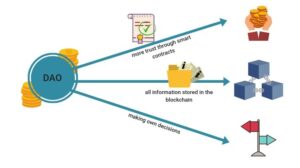Ghost in the Shell-ter
Olympia planners must awaken to two things if they hope to fundamentally shift the affordable housing landscape of our city: our bioregional climate reality and the viability of cryptocurrency and related technologies.
No number of consultants producing $50,000 reports will ever reduce homelessness when hyperinflation and stagnant wages threaten existing renters’ and homeowners’ right livelihood.

No amount of scouring planning documents will reveal meaningful solutions if the designs fail to acknowledge that our era is marked by increasingly destructive, human-perpetuated, global climate change, and fail to implement any permaculture principles. Further housing developments that neglect the socio-ecological cost of materials and design verge on negligence.
Bioregional technologies, cooperatives and startups to the rescue
The appropriate technologies and social structures needed to employ and shelter the unhoused are already available: autonomous modular micro-grids, biodiesel fuel cooperatives, regenerative agriculture distribution networks, and a natural building industry based on renewable biomaterial composites.
Most of this technology is difficult and expensive to pursue for individuals, yet relatively small and coordinated fundraising efforts could fund ambitious startups willing to tackle the challenge at a bioregional scale.
Affordable housing for employed people can be addressed with the same methods but requires an exploration of integration with cryptocurrency given recent inflation rates. Bioregional land-use planning also requires confronting contractors, developers, financiers, and politicians who prefer business as usual in Cheetwoot (one of many indigenous names for this area of the Puget Sound).
Community support models, such as Mutual Aid Cooperatives, have experienced a resurgence in the financial void left by the pandemic, as people strive to make ends meet in challenging times. Techniques and tools for operating these cooperative technologies are already being disseminated globally by students, entrepreneurs, local organizations and social purpose-driven businesses. Alternatives to centralized internet platforms include Neighbourhoods and Hylo, who offer “digital agency” and “data sovereignty” for users coordinating group tasks or economic activity.
New ways of raising capital for projects
New methods of financial transacting—cryptocurrencies and Decentralized Finance (DeFi)—could transform current approaches to low-income housing. Once the domain of early adapters, non-fungible tokens (NFTs), unique units of digital art like photos, animated graphics and videos, are now recognized as legitimate fundraising tools—just like selling art for charity traditionally.
Large sales of NFTs by famous (or young) artists at auction houses like Sotheby’s or Christie’s may steal the headlines, but the utility of digital provenance provided by NFTs enables anyone to sell digital art for any purpose. To put it simply; selling digital art to fundraise for social purposes is just a few clicks away.
Combined with hard cryptoassets like bitcoin, these tools may lead to decentralized economies with global liquidity and cooperative governance. Decentralized Autonomous Organizations (DAOs) already accomplish this task, albeit crudely, compared to traditional multi-stakeholder cooperatives using current software. The technology may be maturing, but the public may still need time to digest the concept of using tokenized digital art to raise funds for permaculture designs for eco-villages to solve the housing crisis, or anything else for that matter.
Evergreen leads in teaching cooperative innovation
An institution with considerable means at its disposal, The Evergreen State College (TESC) is primed to become a bioregional leader in facilitating strategic public-private cooperative partnerships, providing a platform for students, staff, and faculty to engage with their community. Service-learning programs emphasize cooperative alignment with appropriate technology, team-preneurship, permaculture, regenerative agriculture, natural building, and cooperative business dynamics, among other areas.
Evergreen’s Center for Community-Based Learning and Action (CCBLA), Center for Climate Action and Sustainability (CCAS), and Center for Entrepreneurial Leadership and Transformational Change (CELTC) were early advocates for innovative approaches to persistent social problems through partnership with existing government agencies. These departments could contribute to Olympia’s “One Community Plan,” which calls for developing affordable housing action plans and leveraging the city’s Home Fund to build at least 300 new units of supported and low-income housing within the next five years.
What if all the units built through One Community Plan were connected in a resilient team-based food sovereignty network that emulated GruB and implemented gamified garden education programs for residents, supported through Evergreen-led student service-learning exchanges? Public funding for these expensive-to-start alternatives is theoretical so far. but could be realized with new approaches to financing.
No company in our hyper-capitalist society should have any business other than making the world a better place for all beings. Using radical financial transparency, open membership models, emergent technologies that support cooperativism, and Evergreen’s potential leadership, we can create a sustainably-financed, multi-stakeholder, social purpose meta-cooperative that can solve systemic issues.
Such a vision could lead to the development of resilient low-income housing that is place-based and rooted in values of appropriate technology, traditional ecological knowledge and solidarity.
@GuerrillaThink is a distributed identity comprised of eleven individuals who identify as Greeners, changemakers, and coop-operatives. Their main activities include guerrilla marketing, cooperative business consulting, crypto-onboarding, co-creating NFTs, building naturally, and gardening. (guerrillathink.substack.com)